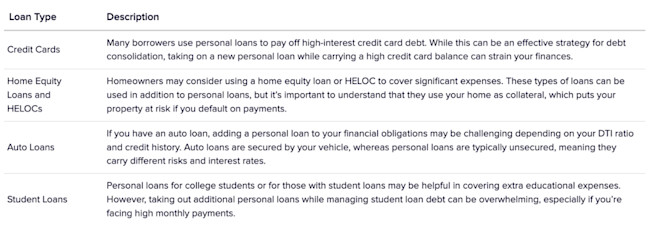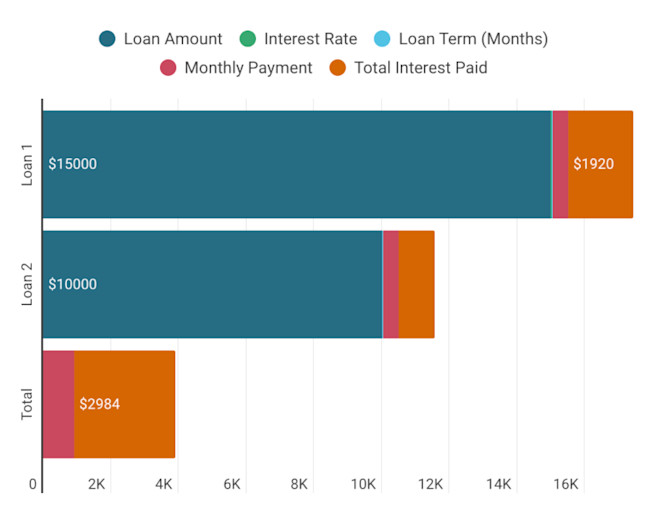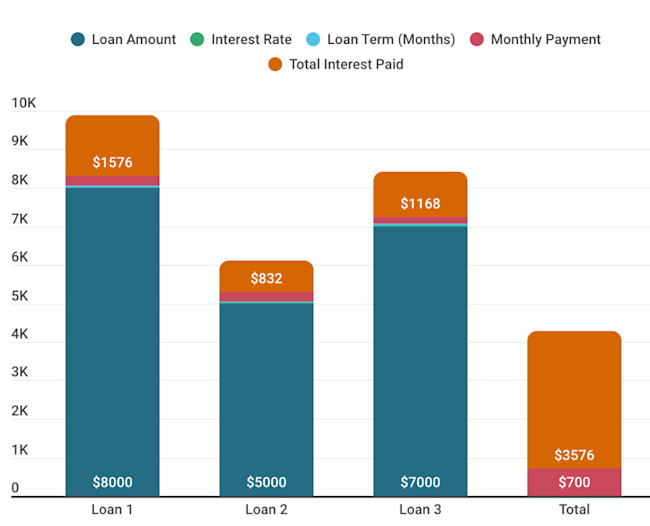How Many Personal Loans Can You Have?

Joy Wallet is advertiser-supported: we may earn compensation from the products and offers mentioned in this article. However, any expressed opinions are our own and aren't influenced by compensation. To read our full disclosure, click here.
How many personal loans can you have all at once?
- If you're tight on cash right now, you may want to consider getting a personal loan. A personal loan is a loan that you can use for just about any purpose like: paying off other debt, renovating your home, or family needs like a wedding or adoption.
- With personal loan interest rates rising, now could be a great time to find a personal loan. Through our partner AmONE, you could get matched to a lender who could offer as much as a $50k loan with rates as low as 5.99% APR.
- Approval and loan terms vary based on applicant qualifications. Not all applicants will qualify for the full amount or lowest available rates. It takes minutes to see your results. And don't worry- filling out the form won't hurt your credit score and is free, so why not give it a try?
Types of loans you can use in conjunction with personal loans

Real examples of taking out multiple personal loans
Example 1: Camilo takes out two personal loans


Example 2: Sarah takes out three personal loans


What factors play into the ability to take out multiple personal loans?
Credit score and credit history
Debt-to-Income ratio (DTI)
Existing loan obligations
Financial situation and eligibility
- 100% free of fees
- $0 origination fees
- $0 to check your rates
- $0 prepayment penalties
- One simple form
Pros and cons of having multiple personal loans
Pros
Cons
How to manage multiple personal loans
- Refinance to get better rates. If interest rates have dropped since you first took out your loans, or if your credit score has improved, you may be able to refinance for a lower interest rate. This can help reduce your monthly payments and make your loans more manageable. Refinancing can also be a useful strategy for consolidating multiple loans into a single loan with one monthly payment. By refinancing, you can take advantage of lower rates and potentially save money over the life of the loan.
- Consider debt consolidation. If managing multiple loans is overwhelming, consider consolidating them into one loan. Debt consolidation can simplify your monthly payments, making it easier to keep track of due dates and reducing the likelihood of missed payments. Debt consolidation loans are often available at lower interest rates compared to credit cards or other high-interest debt. This can help reduce your monthly debt payments and improve your overall financial stability. Think carefully though as it's important to avoid accumulating new debt after consolidating, as this can lead to a cycle of borrowing that is difficult to break.
- Stay on top of monthly payments. Staying on top of monthly payments is often easier said than done, especially when unexpected expenses arise. Setting up automatic payments can help alleviate some stress, allowing you to focus on other aspects of your financial well-being. If you’re struggling to make ends meet and down on your luck financially, think about speaking with your lenders about temporary relief options—they may be more understanding than you expect.
- If you're tight on cash right now, you may want to consider getting a personal loan. A personal loan is a loan that you can use for just about any purpose like: paying off other debt, renovating your home, or family needs like a wedding or adoption.
- With personal loan interest rates rising, now could be a great time to find a personal loan. Through our partner AmONE, you could get matched to a lender who could offer as much as a $50k loan with rates as low as 5.99% APR.
- Approval and loan terms vary based on applicant qualifications. Not all applicants will qualify for the full amount or lowest available rates. It takes minutes to see your results. And don't worry- filling out the form won't hurt your credit score and is free, so why not give it a try?
The bottom line
Joy Wallet is an independent publisher and comparison service, not an investment advisor, financial advisor, loan broker, insurance producer, or insurance broker. Its articles, interactive tools and other content are provided to you for free, as self-help tools and for informational purposes only. They are not intended to provide investment advice. Joy Wallet does not and cannot guarantee the accuracy or applicability of any information in regard to your individual circumstances. We encourage you to seek personalized advice from qualified professionals regarding specific investment issues. Featured estimates are based on past market performance, and past performance is not a guarantee of future performance.
Our site doesn’t feature every company or financial product available on the market. We are compensated by our partners, which may influence which products we review and write about (and where those products appear on our site), but it in no way affects our recommendations or advice. Our editorials are grounded on independent research. Our partners cannot pay us to guarantee favorable reviews of their products or services.
We value your privacy. We work with trusted partners to provide relevant advertising based on information about your use of Joy Wallet’s and third-party websites and applications. This includes, but is not limited to, sharing information about your web browsing activities with Meta (Facebook) and Google. All of the web browsing information that is shared is anonymized. To learn more, click on our Privacy Policy link.
Images appearing across JoyWallet are courtesy of shutterstock.com.
Benjamin is a writer and entrepreneur who spent 15 years in Asis involved in the real estate and financial services industry. He currently writes about finance, real estate, geopolitics, and short stories involving his cat from Argentina named Tuki. He has written for The Motley Fool, SuperMoney, and other online and offline publications spanning the globe.










